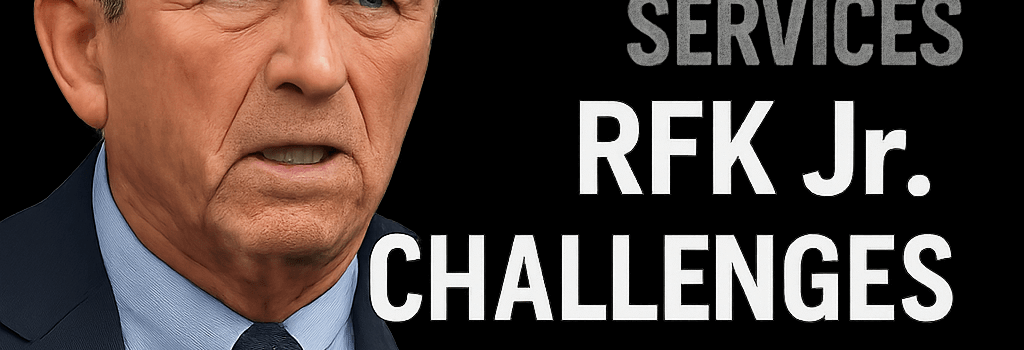RFK Jr. Challenges Preventive Health Task Force

Background
On June 24, 2025, U.S. Department of Health and Human Services (HHS) Secretary Robert F. Kennedy Jr. unexpectedly canceled a meeting of the United States Preventive Services Task Force (USPSTF), a scientifically independent panel comprising up to 16 volunteer experts. The USPSTF issues evidence-based recommendations on preventive interventions—from colonoscopies and mammograms to folic acid supplementation during pregnancy—using a transparent framework and assigning letter grades (A to D) based on the strength of evidence and net benefit.
What Is the USPSTF?
The USPSTF operates under a rigorous methodology:
- Analytic Framework: Defines clinical questions, target populations, and outcomes.
- Systematic Evidence Review: Conducted by the Evidence-based Practice Center (EPC), following GRADE criteria (Grading of Recommendations Assessment, Development and Evaluation).
- Draft Recommendation Statements: Publicly shared for comment, with disclosure of conflicts of interest and voting records.
- Final Recommendation: A/B-grade services are adopted nationwide and mandated for coverage without patient cost-sharing under Section 2713 of the Affordable Care Act (ACA).
Political Context and Comparisons
The abrupt cancellation parallels HHS actions against the Advisory Committee on Immunization Practices (ACIP) at the Centers for Disease Control and Prevention (CDC). In February 2025, Kennedy canceled an ACIP meeting, and by June 9, he had dismissed all 17 existing members, replacing them with seven handpicked individuals—many lacking established expertise in vaccinology and sharing anti-vaccine viewpoints. During their June session, the reconstituted ACIP withdrew longstanding flu vaccine recommendations based on discredited studies and announced plans to re-evaluate the entire childhood immunization schedule, including measles vaccines.
Legal and Regulatory Implications
On June 27, 2025, the Supreme Court upheld ACA Section 2713, preserving coverage mandates for USPSTF A- and B-grade recommendations. While this ruling secures patient access to preventive services, it also reaffirms the HHS Secretary’s authority to reconstitute or neutralize the task force:
“If past is prologue, it may suggest they are preparing to eliminate or emasculate the committee,” warned Peter Lurie, Executive Director of the Center for Science in the Public Interest.
Healthcare IT and Data Systems Impact
Electronic Health Record (EHR) systems and Clinical Decision Support (CDS) modules integrate USPSTF guidelines via eCQMs (electronic Clinical Quality Measures) and HL7 FHIR Implementation Guides. For example:
- FHIR Profiles: Standardize data exchange for preventive services (e.g., Immunization, Observation resources).
- eCQM Specifications: Automate reporting on metrics like colorectal cancer screening rates.
- Interoperability: Ensures consistent patient reminders and insurance claim processing aligned with USPSTF recommendations.
Potential Disruptions
Cancelling or downranking USPSTF guidelines could lead to:
- Inconsistent coverage coding (CPT/HCPCS) billed to insurers.
- Disruptions in EHR interrupting clinical workflows and preventive care reminders.
- Increased out-of-pocket costs for patients when A/B services lose their no-cost mandate.
Expert Perspectives
“Political interference undermines the integrity of a process that underpins quality metrics, value-based care, and ultimately patient trust,” said Dr. Samantha Lee, Chief Medical Informatics Officer at MedData Analytics.
More than 100 organizations, including the American Medical Association, American Academy of Pediatrics, and American Public Health Association, signed a letter urging Congress to safeguard the USPSTF from intentional or unintentional political interference, citing potential devastation to hospital systems and public health outcomes.
Additional Analysis: Scenarios and Safeguards
Analysts outline three scenarios:
- Task Force Disbanded: Preventive guidelines decentralized to various agencies, risking fragmentation.
- Reconstitution with Partisan Appointees: Erosion of evidence grading, similar to ACIP case.
- Congressional Legislation: Amend ACA to codify USPSTF independence, strengthening legal safeguards.
Conclusion
The cancellation of the USPSTF meeting marks a critical juncture in U.S. preventive health policy. As clinical decision support systems, insurance coverage policies, and public health outcomes hinge on the task force’s recommendations, stakeholders are calling for immediate legislative action to protect this cornerstone of evidence-based care.